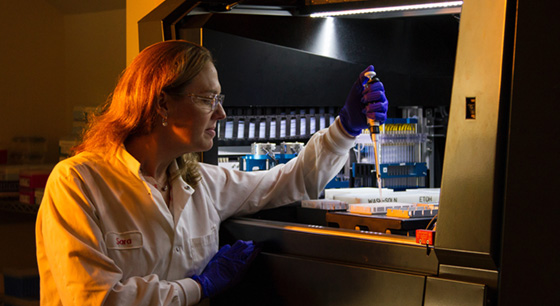Home / Research / Core Facilities /
 The Genetics Core is designed to integrate cutting-edge genomic technologies into the research programs of investigators to enhance the understanding of Intellectual and Developmental Disabilities (IDDs) and develop treatments. The mission of our IDDRC includes supporting research aimed at identifying genetic causes of IDDs, recurrence risk counseling, monitoring for associated medical complications, and supportive treatments. Further, we facilitate efforts to characterize epigenetic, transcriptomic, and proteomic responses to environmental and genetic insults involved in IDD pathogenesis using patient derived and genome-edited cellular and animal models.
The Genetics Core is designed to integrate cutting-edge genomic technologies into the research programs of investigators to enhance the understanding of Intellectual and Developmental Disabilities (IDDs) and develop treatments. The mission of our IDDRC includes supporting research aimed at identifying genetic causes of IDDs, recurrence risk counseling, monitoring for associated medical complications, and supportive treatments. Further, we facilitate efforts to characterize epigenetic, transcriptomic, and proteomic responses to environmental and genetic insults involved in IDD pathogenesis using patient derived and genome-edited cellular and animal models.
Our translational mission has engendered the development of highly interactive service components that both inform and enable these goals. For example, gene identification efforts often require careful phenotypic characterization through CNS imaging (Brain Imaging Core) and/or Behavioral Evaluation Center. Identified genetic variants are further validated in cohorts of patients with similar phenotypes and can then be developed into novel diagnostic tools and targets for therapy (Clinical Translational Core).
To optimally support core objectives, the GC is organized into 3 service components:
- The Human Genomics Component which supports technologies to identify all types of human genetic variation including copy number microarrays, targeted next generation sequencing (NGS), and whole exome sequencing;
- The Functional Genomics Component which assists investigators to study global gene expression, non-coding RNAs, and proteomics. Extensive bioinformatics services are provided by both components; and
- The Model Systems Component which supports genome engineering to create cellular and animal models, disease modeling in induced pluripotent stem cells (iPSC), and differentiation protocols for nervous system cell types and organoids.
Component services are organized into three categories:
- Direct consultation and bioinformatics services supported entirely by the Core;
- Linked services provided through UW Centers where priority of access is provided to affiliates, but investigator funds will be required; and
- Coordinated services through other facilities also requiring investigator funds.
Additionally, the Genetics Core will coordinate consultation on Topical resources utilizing experts housed in the UW Health Sciences complex.
Genetics Core
-
 Kimberly Aldinger Co-Director
Kimberly Aldinger Co-Director -
 Jessica Chong Co-Director
Jessica Chong Co-Director
Genetics Core
-
 Kimberly Aldinger Co-Director
Kimberly Aldinger Co-Director -
 Jessica Chong Co-Director
Jessica Chong Co-Director
